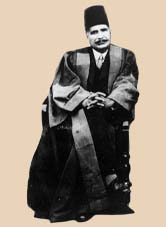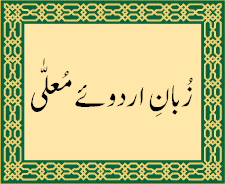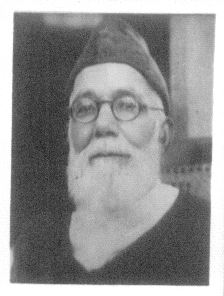
Sir Syed Ahmad KhanKCSI, also spelled Sayyid Ahmad Khan, was an Indian Muslim reformer, philosopher, and educationist in nineteenth-century British India. Though initially espousing Hindu–Muslim unity, he later became the pioneer of Muslim nationalism in India and is widely credited as the father of the two-nation theory, which formed the basis of the Pakistan movement. Born into a family with strong ties to the Mughal court, Ahmad studied science and the Quran within the court. He was awarded an honorary LLD from the University of Edinburgh in 1889.

Shibli Nomani was an Islamic scholar, poet, philosopher, historian, educational thinker, author, orator, reformer and critic of orientalists from Indian subcontinent during the British Raj. He is regarded as the father of Urdu historiography. He was also proficient in Arabic and Persian languages. Shibli was associated with two influential movements in the region, the Aligarh and the Nadwa movements. As a supporter of the Deobandi school, he believed that English language and European sciences should be incorporated into the education system. Shibli wrote several biographies of Muslim heroes, convinced that Muslims of his time could learn valuable lessons from the past. His synthesis of past and modern ideas contributed significantly to Islamic literature produced in Urdu between 1910 and 1935. Shibli established the Darul Musannefin Shibli Academy in 1914 to promote Islamic scholarship and also founded the Shibli National College in 1883. Although he collected much material on the life of Prophet Muhammad, he could only complete the first two volumes of the planned work, Sirat al-Nabi. His disciple, Sulaiman Nadvi, added to this material and wrote the remaining five volumes after Shibli's death.

Syed Sulaiman Nadvi was a Pakistani historian, writer and scholar of Islam. He co-authored Sirat-un-Nabi and wrote Khutbat-e-Madras. He was a member of the founding committee of Jamia Millia Islamia.

This is a selective list of scholarly works related to Muhammad Iqbal, the poet-philosopher of the Indian subcontinent.

The Urdu movement was a socio-political movement aimed at making the Urdu standard of the Hindostani language as the universal lingua-franca and symbol of the cultural and political identity of the Muslim communities of the Indian subcontinent during the British Raj. The movement began with the fall of the Mughal Empire in the mid-19th century, fuelled by the Aligarh movement of Sir Syed Ahmed Khan. It strongly influenced the All India Muslim League and the Pakistan movement.

Aslam Jairajpuri(Urdu:علامہ اسلم جیراجپوری) was a scholar of Qur'an, Hadith, and Islamic history who is best known for his books Talimat-e-Qur'an and "History of Qur'an. He was Distinguished Professor of Arabic and Persian at Aligarh Muslim University and Jamia Millia Islamia. He was born on 27 January 1882 in Jairajpur, Azamgarh, in Uttar Pradesh, India, and died on 28 December 1955 in Delhi.
Abdus Sattar Khan Niazi was a Pakistani religious and political leader.

Chaudhry Niaz Ali Khan was a civil engineer, agriculturalist, and philanthropist who founded "Dar ul Islam Movement" and "Dar ul Islam Trust" in South Asia and "Dar ul Islam Trust" Institutes in Pathankot and Jauharabad. Besides a philanthropist, Niaz was also a civil servant, and a landowner. He was the member of All-India Muslim League and a participant of the Pakistan Movement with the ultimate aim of creating the Muslim-majority areas of British India.

Tolu-e-Islam is a historical, political, religious, cultural magazine of Muslims of British India and Pakistan. In 1935, according to the instructions of Sir Muhammad Iqbal, Syed Nazeer Niazi initiated and edited a journal named after "Tulu'i Islam", a poem by Iqbal. Niazi also dedicated the first edition of this journal to him. For a long time Iqbal had wanted a journal to propagate his ideas and the aims and objective of the All-India Muslim League.

Syed Mir Hassan was an Indian Ahl-e-Hadith scholar of the Qur'an, Hadith, Sufism, and the Arabic language. He was a professor of Arabic at Scotch Mission College in Sialkot and was awarded the title of Shams al-’Ulama’ by the British Crown. Mir Hassan is best known as the teacher of the philosopher-poet Muhammad Iqbal and the poet Faiz Ahmad Faiz. He was also the paternal uncle of the Pakistani journalist Syed Nazeer Niazi and was affiliated with Sir Syed Ahmed Khan's rationalist school of Islamic modernism.

Syed Shuja’at Ali Qadri was the first Grand Mufti of Pakistan, Judge of Federal Shariat Court, a member of the Pakistani Council of Islamic Ideology, and a scholar of Islamic Sciences and modern science. He was influenced by Mustafa Raza Khan Qadri.

Sir Allama Muhammad Iqbal was a philosopher, South Asian Muslim writer, scholar and politician, whose poetry in the Urdu language is considered among the greatest of the twentieth century, and whose vision of a cultural and political ideal for the Muslims of the British Raj was to animate the impulse for Pakistan. He is commonly referred to by the honorific Allama.
Raja Hassan Akhtar; was a political worker in the Pakistan Muslim League prior to the independence of Pakistan in 1947. After independence, he was a Member Pakistan National Assembly (MNA), President, West Pakistan Muslim League, Vice President, All Pakistan Muslim League, and Tehrik–e–Pakistan Gold Medalist
Ghulam Rasool Mehr was a Pakistani Muslim scholar and political activist born in Phoolpur, a village in the district of Jalandhar, British India.
Jamaat Ali Shah (1834–1951) was a Sufi of the Naqshbandi order and an author. He was President of All India Sunni Conference and the leader of the Shaheed Ganj Mosque. He was an influential leader of the Pakistan Movement.
Abul Wafa Sanaullah Amritsari was a British Indian, later Pakistani, Muslim scholar and a leading figure within the Ahl-e-Hadith movement who was active in the Punjab city of Amritsar. He was an alumnus of Mazahir Uloom and the Darul Uloom Deoband. He was a major antagonist of Mirza Ghulam Ahmad and the early Ahmadiya movement. He served as the general secretary of the All India Jamiat-i- Ahl-i-Hadith from 1906 to 1947 and was the editor of the Ahl-e-Hadees, a weekly magazine.

This page list topics related to Muhammad Iqbal.
Presidential Iqbal Award is a literary award which is presented by Iqbal Academy Pakistan with the approval of the President of Pakistan. The award is conferred for the best books written on national poet-philosopher Allama Muhammad Iqbal’s life and ideology in national and foreign languages.












